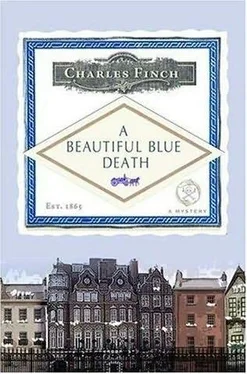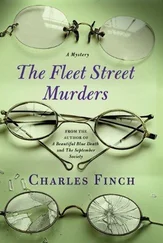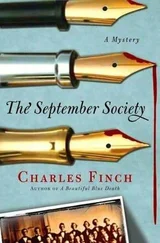Charles Finch - Beautiful blue death
Здесь есть возможность читать онлайн «Charles Finch - Beautiful blue death» весь текст электронной книги совершенно бесплатно (целиком полную версию без сокращений). В некоторых случаях можно слушать аудио, скачать через торрент в формате fb2 и присутствует краткое содержание. Жанр: Исторический детектив, на английском языке. Описание произведения, (предисловие) а так же отзывы посетителей доступны на портале библиотеки ЛибКат.
- Название:Beautiful blue death
- Автор:
- Жанр:
- Год:неизвестен
- ISBN:нет данных
- Рейтинг книги:5 / 5. Голосов: 1
-
Избранное:Добавить в избранное
- Отзывы:
-
Ваша оценка:
- 100
- 1
- 2
- 3
- 4
- 5
Beautiful blue death: краткое содержание, описание и аннотация
Предлагаем к чтению аннотацию, описание, краткое содержание или предисловие (зависит от того, что написал сам автор книги «Beautiful blue death»). Если вы не нашли необходимую информацию о книге — напишите в комментариях, мы постараемся отыскать её.
Beautiful blue death — читать онлайн бесплатно полную книгу (весь текст) целиком
Ниже представлен текст книги, разбитый по страницам. Система сохранения места последней прочитанной страницы, позволяет с удобством читать онлайн бесплатно книгу «Beautiful blue death», без необходимости каждый раз заново искать на чём Вы остановились. Поставьте закладку, и сможете в любой момент перейти на страницу, на которой закончили чтение.
Интервал:
Закладка:
Charles Finch
Beautiful blue death
Chapter 1
The fateful note came just as Lenox was settling into his armchair after a long, tiresome day in the city. He read it slowly handed it back to Graham, and told him to throw it away. Its contents gave him a brief moment of preoccupation, but then, with a slight frown, he picked up the evening edition of the Standard and asked for his tea.
It was a bitterly cold late afternoon in the winter of 1865, with snow falling softly over the cobblestones of London. The clock had just chimed five o’clock, and darkness was dropping across the city-the gas lights were on, the shops had begun to close, and busy men filled the streets, making their way home.
It was the sort of day when Lenox would have liked to sit in his library, tinkering with a few books, pulling down atlases and maps, napping by the fire, eating good things, writing notes to his friends and correspondents, and perhaps even braving the weather to walk around the block once or twice.
But alas, such a day wasn’t meant to be. He had been forced to go down to the Yard, even though he had already given Inspector Exeter what he thought was a tidy narrative of the Isabel Lewes case.
It had been an interesting matter, the widely reported Marlborough forgery-interesting, but, in the end, relatively simple. The family should never have had to call him in. It was such a characteristic failure for Exeter: lack of imagination. Lenox tried to be kind, but the inspector irritated him beyond all reason. What part of the man’s mind forbade him from imagining that a woman, even as dignified a woman as Isabel Lewes, could commit a crime? You could be proper or you could investigate. Not both. Exeter was the sort of man who had joined the Yard partly for power and partly because of a sense of duty, but never because it was his true vocation.
Well, well, at least it was done. His bones were chilled straight through, and he had a pile of unanswered letters on his desk, but at least it was done. He scanned the headlines of the newspaper, which drooped precariously over his legs, and absentmindedly warmed his hands and feet by the large bright fire.
What bliss was there to compare to a warm fire, fresh socks, and buttered toast on a cold day! Ah, and here was his tea, and Lenox felt that at last he could banish Exeter, the Yard, and female criminals from his mind forever.
He sat in a long room on the first floor of his house. Nearest the door was a row of windows that looked out over the street he lived on, Hampden Lane. Opposite the windows was a large hearth, and in front of the hearth were a few armchairs, mostly made of red leather, where he was sitting now, and little tables piled high with books and papers. There were also two leather sofas in the middle of the room, and by the window a large oak desk. On the other two walls there were oak bookshelves that held the library he had collected over the years.
Lenox was a man of perhaps forty, with brown hair still untouched by age. He had been lean in his youth, and now, though he weighed more, he was still a tall thin man who stood erect, though without the uncomfortably ascetic bearing of many tall thin men. He had bright cheeks, a pleasant smile, and a short beard, such as men in Parliament were wont to wear. His eyes were a clear hazel and occasionally betrayed his geniality, for they would sharpen when he was absorbed with an idea or a suspicion.
If at twenty he had been single-minded and occasionally obsessive, at forty he had mellowed and now preferred to sit in front of a warm fire, reading the newspaper with a cup of tea in his hand. He had always loved his friends and his family dearly but took more pleasure in them now. He had always loved his work but allowed himself to be diverted from it more often now. It had simply happened that he had never married, and now he was a thorough bachelor, comfortable company but set in his ways and a good deal more snug at home than in the first ambition of his youth. Lenox hadn’t changed, in his own estimation; and yet of course he had, as all men do.
The tea tray sat on a small side table by his chair, next to a stack of books, several of which had fallen to the floor, where he had left them the night before. The servants had learned by now to leave his library as he left it, except for an occasional dusting. He poured a healthy cup of tea, took a large scoop of sugar and a splash of milk, and then turned his attention to the plate of toast. Graham had thoughtfully added a small cake, which was a rare treat. But then, it had been a trying day.
After several cups of tea, a few pieces of toast, and a slice of the cake, he pushed the tray away with a feeling of contentment, dropped his paper on the floor, and picked up a slim leather volume. It was a recently published edition of The Small House at Allington, which he was reading slowly in order to savor it. Today he would give himself two chapters: another small reward for coping with both Inspector Exeter and the fearsome weather.
Graham came in after a moment to take away the tray.
“Excuse the interruption, sir,” he said, “but will there be a reply to Lady Grey’s letter?”
“It’s horribly cold outside, Graham.”
“Indeed, sir?”
“Really horribly cold. You expect a seal to stroll by you on the street.”
“Are you warm now, sir?”
“Yes, a little better. I was only thinking about the cold.”
“Sir?”
Lenox sighed. “I suppose I’ll have to go next door, though.” There was a pause while he looked glumly into the fire.
“To Lady Grey’s, sir?” said Graham.
Lenox didn’t respond. He continued to look glum. Finally he said, “Yes, to Lady Grey’s. I hate to do it, though.”
“I’m sorry to hear that, sir,” said Graham.
“It’s beastly cold outside.”
“It is, sir.”
Lenox looked more and more glum. “Can’t be helped, I expect,” he said.
“No, sir.”
Lenox sighed. “Will you get my things, then?”
“Of course, sir,” said Graham. “Does this mean that you don’t wish to reply-”
“No, no, no. That’s why I’m going over.”
“Very good, sir.”
As the butler left, Lenox stood up and walked over to the window behind his desk. He had been looking forward to a night in by the fire, but he was being foolish, he thought. It was only a house away. He should put his boots on-they were tossed under his desk, next to an open copy of Much, Ado -and get ready to go. They would be just about dry, he hoped. And in truth he looked forward to seeing her.
Lady Jane Grey was a childless widow of just past thirty, who lived in the next house over. She was one of his closest friends in the world. This had been the case ever since they were children in Sussex. Sir Edmund, Charles’s older brother, had once been in love with Lady Jane, but that was when they were all much younger, when Charles was just out of Harrow and on his way to Oxford.
Lenox and Lady Jane were neighbors on Hampden Lane, living next to each other in a row of gray stone houses on a little slip of an alley just off of St. James’s Park in the neighborhood of May-fair. As it had been for some time, Mayfair was the most prestigious address in London-and yet he had decided to live there because it was so near St. James’s, where Lenox had gone with his father when he was a child.
The park was surrounded by palaces: Buckingham Palace to the left, St. James’s Palace to the right, and Westminster Palace, more commonly known as Parliament, straight ahead. Like so many parks in London it had begun life as a place for Henry VIII to shoot deer, but Charles II, whom Lenox had always been fond of as a schoolboy, had opened it to the public and had often fed the ducks there himself, where he could talk with his subjects. Only thirty years ago they had changed all the canals into lakes, bred swans on the lakes, and planted beautiful willow trees. People skated there in the winter and walked through the brilliant green fields in the summer, and no matter what season it was, Lenox took a walk through it most nights-at least when he didn’t have a case.
Читать дальшеИнтервал:
Закладка:
Похожие книги на «Beautiful blue death»
Представляем Вашему вниманию похожие книги на «Beautiful blue death» списком для выбора. Мы отобрали схожую по названию и смыслу литературу в надежде предоставить читателям больше вариантов отыскать новые, интересные, ещё непрочитанные произведения.
Обсуждение, отзывы о книге «Beautiful blue death» и просто собственные мнения читателей. Оставьте ваши комментарии, напишите, что Вы думаете о произведении, его смысле или главных героях. Укажите что конкретно понравилось, а что нет, и почему Вы так считаете.












